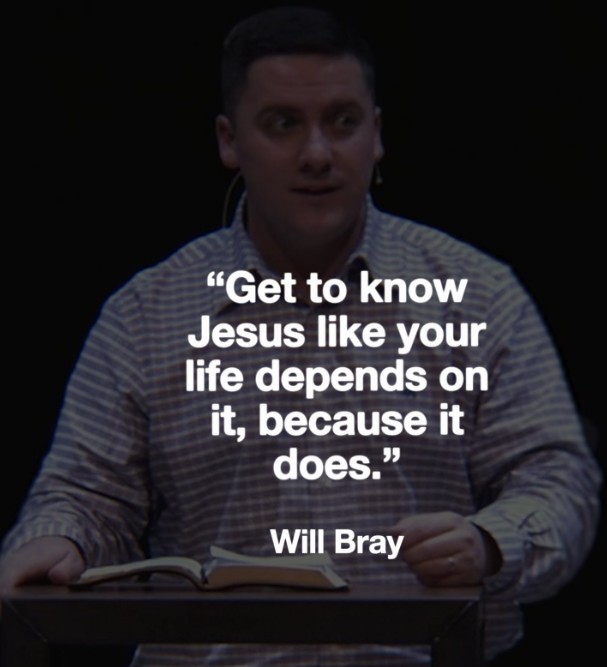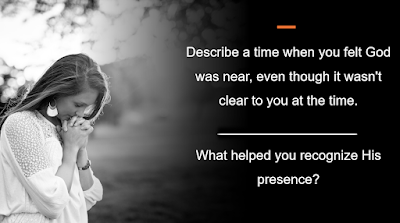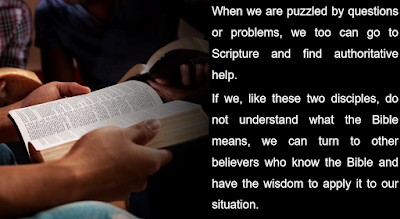New Series - Through the Bible
Welcome to the first Sunday in our year in the Bible. This is a year long reading plan through the Bible as well. I hope you will use the daily reading plan for your devotional time every morning.
Our first weekly study is starting in a place many might find odd: Luke’s account of Jesus' resurrection. In a journey through the Bible, you might have expected that we would start at a more logical place, like the beginning - Genesis 1. Don’t worry; we will get there. We are looking at a text that will help us understand the Bible better as we read it and walk through it together.
Luke 24 finds two men walking home after a horrible weekend in Jerusalem. These two men were Jesus’s followers, but all their hopes had been dashed over the weekend as they saw Christ arrested, tried, and ultimately crucified on the cross. Jesus was dead. The hope of a better day was dead, too, or so they thought.
As these men walk home, the resurrected Savior shows up and begins a conversation with them about the events that had unfolded in Jerusalem. These men have no idea who they are talking to and begin to let their despondency show. Their Savior had suffered and died, and now they are sulking. In this conversation, Jesus begins to reveal himself to show the disciples that things aren't quite what they seem. Yes, He suffered. Yes, He died. However, now He is alive, and all that happened to Him was necessary according to the plan of God.
To explain how His arrest, crucifixion, and
resurrection were necessary, Jesus turns to the Old Testament to show how
everything previously written pointed to the life, death, and resurrection of
Jesus Christ. Jesus's explanation of the Bible in Luke 24 tells us that if we
read the Bible correctly, we see that the Bible, every verse, every chapter,
and every book is a book about Jesus.
We start our year in the Bible in Luke 24
because the goal is not just to read the Bible this year but to understand the
Bible this year. To understand the Bible, you don’t need to start with Genesis
1; you need to start with Jesus. When we start with Jesus, we find the one
who was already there in the beginning and created all things. When we start with
Jesus, we find the key to understanding the whole Bible.
Read the Bible with Upstate Church this year,
but remember, start where we are starting this Sunday, with Jesus.
Bottom Line: We read the Bible to encounter Jesus!
Scripture Reveals Who Jesus Is
Scripture Reveals Who We Are
Scripture Reveals Our Need for Community
Sermon Recap
- Christians do not read the Bible as if it were just another book about just another topic! We read the Bible as God's revelation about His Son, Jesus Christ.
- The disciples on the road to Emmaus are in crippling despair, but it’s in moments of hopelessness that Jesus works best.
- In Luke 24, Jesus teaches us how to read the Bible. We are to read every word to see how it points us to Jesus Christ.
- If the entire Bible is about Jesus, then we know that the Son of God being killed on the cross and rising again on the third day was God’s plan all along!
Luke 24:13-35
13 That very day two of them were going to a
village named Emmaus, about seven miles from Jerusalem, 14 and they were
talking with each other about all these things that had happened. 15 While they
were talking and discussing together, Jesus himself drew near and went with
them. 16 But their eyes were kept from recognizing him. 17 And he said to them,
“What is this conversation that you are holding with each other as you walk?”
And they stood still, looking sad. 18 Then one of them, named Cleopas, answered
him, “Are you the only visitor to Jerusalem who does not know the things that
have happened there in these days?” 19 And he said to them, “What things?” And
they said to him, “Concerning Jesus of Nazareth, a man who was a prophet mighty
in deed and word before God and all the people, 20 and how our chief priests
and rulers delivered him up to be condemned to death and crucified him. 21 But
we had hoped that he was the one to redeem Israel. Yes, and besides all this,
it is now the third day since these things happened. 22 Moreover, some women of
our company amazed us. They were at the tomb early in the morning, 23 and when
they did not find his body, they came back saying that they had even seen a
vision of angels, who said that he was alive. 24 Some of those who were with us
went to the tomb and found it just as the women had said, but him they did not
see.” 25 And he said to them, “O foolish ones, and slow of heart to believe all
that the prophets have spoken! 26 Was it not necessary that the Christ should suffer
these things and enter into his glory?” 27 And beginning with Moses and all the
Prophets, he interpreted to them in all the Scriptures the things concerning
himself. 28 So they drew near to the village to which they were going. He acted
as if he were going farther, 29 but they urged him strongly, saying, “Stay with
us, for it is toward evening and the day is now far spent.” So, he went in to
stay with them. 30 When he was at table with them, he took the bread and
blessed and broke it and gave it to them. 31 And their eyes were opened, and
they recognized him. And he vanished from their sight. 32 They said to each
other, “Did not our hearts burn within us while he talked to us on the road,
while he opened to us the Scriptures?” 33 And they rose that same hour and
returned to Jerusalem. And they found the eleven and those who were with them
gathered together, 34 saying, “The Lord has risen indeed, and has appeared to
Simon!” 35 Then they told what had happened on the road, and how he was known
to them in the breaking of the bread.
The
Holy Bible: English Standard Version (Wheaton, IL: Crossway Bibles, 2016), Lk
24:13–35.
Discussion Questions
"What things?" (Luke 24:19)
When Jesus asks the disciples about their
conversation, He invites them to express their doubts and struggles. How does
Jesus' question encourage authenticity in our own relationship with Him and
others? How can we create a space in this group for honest dialogue about our
faith and struggles?
"But we had hoped..." (Luke 24:21)
The disciple’s express disappointment and
shattered expectations about who they thought Jesus would be. What are some
ways we experience unmet expectations in our walk with God? How can we learn to
trust God's plan even when it looks different from our own?
"Was it not necessary that the Christ
should suffer these things and enter into his glory?" (Luke 24:26)
Jesus reframes their understanding of His
suffering by pointing them to Scripture. How does this passage challenge us to
view suffering considering God’s greater redemptive plan? How can we rely on
God’s Word for clarity when we face confusion or hardship?
"Did not our hearts burn within us while
he talked to us on the road?" (Luke 24:32)
The disciples reflect on how their hearts
were stirred as Jesus explained the Scriptures. When have you experienced a
similar moment where God’s Word brought clarity, conviction, or comfort? How
can we cultivate a deeper hunger for the Scriptures in our daily lives?
"Then they told what had happened on the
road, and how he was known to them in the breaking of the bread." (Luke 24:35)
The disciples share how Jesus revealed
Himself through the Word and a shared meal. How does this encourage us to see
Jesus in both the study of Scripture and in fellowship with others? How can we
be intentional about sharing how God is working in our lives to encourage
others?
After you read Luke 24:13-35, make
observations about the text.
What is God teaching us in the passage?
What does this reveal about who God is, what
God has done, and how I should respond?
Which part of the text was most meaningful to
you and why?
What do you need help understanding about
this passage?
END
Teacher Notes:
TO UNDERSTAND the Bible, you don’t need to start with Genesis; you need to start with Jesus. In Jesus, we find the One who was already there in the beginning and created all things. When we start with Jesus, we find the key to understanding the whole Bible.

























